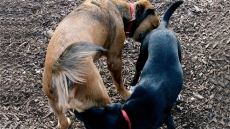How a parent responds to an infant's babbling can speed up the child's language development, new research shows.
"Parents may not understand a baby's prattling, but by listening and responding, they let their infants know they can communicate which leads to children forming complex sounds and using language more quickly," researchers observed.
The findings challenge the belief that human communication is innate and cannot be influenced by parental feedback.
"Instead, parents who consciously engage with their babbling infants can accelerate their children's vocalising and language learning," said Julie Gros-Louis, an assistant professor of psychology at the University of Iowa.
Researchers observed the interactions between 12 mothers and their 8-month-old infants twice a month for 30 minutes over a six-month period.
They noted how the mothers' responded to their child's positive vocalizations, such as babbling and cooing, especially when it was directed toward the mother.
Researchers discovered that infants whose mothers responded to what they thought their babies were saying, showed an increase in developmentally advanced, consonant-vowel vocalisations.
"It means the babbling has become sophisticated enough to sound more like words. The babies also began directing more of their babbling over time toward their mothers," Gros-Louis noted.
On the other hand, infants whose mothers did not try as much to understand them and instead directed their infants' attention at times to something else did not show the same rate of growth in their language and communication skills.
In a survey a month after the study ended, mothers who were most attentive to their infants' babbling reported their children produced more words and gestures at age 15 months.
The study was published in the journal Infancy.





